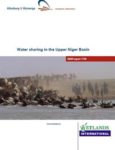The scope of this study encompasses the Upper Niger Basin in Mali, focussing on the downstream Inner Niger Delta up to Tombouctou. It focuses on the core bottlenecks and options with regard to IWRM and green development in the basin and steps which have been set – in terms of knowledge development, stakeholder engagement, implementation (emerging practices) – towards a more integrated approach.

Water sharing in the Upper Niger Basin
TéléchargerDescription:
Mali is facing a huge challenge. Promotion of food security is of top priority for which a further expansion of Office du Niger is one of the most promising options. This implies land development and additional water extraction from the Niger. At the same time water is needed for the booming energy demand. Water, however, is limitedly available and crucial to other sectors of the environment, not in the least the flood-driven ecosystem and economy of the downstream Inner Niger Delta. Almost 1,5 million fishermen and farmers make a living in the delta. Their livelihoods – fishing, rice growing and livestock grazing – depend on the annual floodings. Globally, the Inner Niger Delta is an ecological hotspot and the region is of crucial importance for Eurasian migratory bird populations. Tapping the Niger´s flow is, therefore, not without consequences.